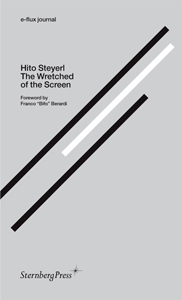In Hito Steyerl's writing we begin to see how, even if the hopes and desires for coherent collective political projects have been displaced onto images and screens, it is precisely here that we must look frankly at the technology that seals them in.
The Wretched of the Screen collects a number of Steyerl's landmark essays from recent years in which she has steadily developed her very own politics of the image. Twisting the politics of representation around the representation of politics, these essays uncover a rich trove of information in the formal shifts and aberrant distortions of accelerated capitalism, of the art system as a vast mine of labor extraction and passionate commitment, of occupation and internship, of structural and literal violence, enchantment and fun, of hysterical, uncontrollable flight through the wreckage of postcolonial and modernist discourses and their unanticipated openings.
Hito Steyerl (born 1966 in Munich, lives and works in Berlin) is a filmmaker and writer. She teaches New Media Art at University of the Arts in Berlin. Steyerl studied film at the Academy of Visual Arts in Tokyo, the University of Television and Film in Munich, and holds a Ph.D in philosophy from the Academy of Fine Arts, Vienna. The most formative parts of her education, however, include working as a stunt-girl and bouncer. Steyerl's work focuses on the intersection of media technology, political violence, and desire by using humor, charm, and reduced gravity as political means of expression. Her sources range from appropriated low-fi clips and sounds to mostly misquoted philosophical fittings. These elements are condensed in rambling essayistic speculation in both text and imagery. Through her oversensitivity to analogies, Steyerl both collects and creates stories describing realities that are stranger than fiction and reflected upon in galloping thought experiments. Her work has been exhibited in numerous solo and group exhibitions including documenta 12, Taipei Biennial 2010, and 7th Shanghai Biennial. Her written essays have proliferated more on- than offline in journals such as e-flux and eipcp.

